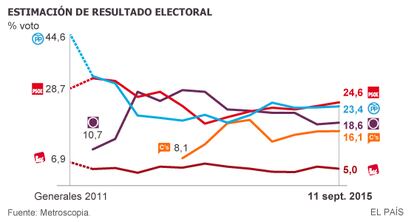Socialists pull out slight lead over Popular Party in latest polls
67 percent of those surveyed would like to see a government based on cross-party pacts

If general elections were held in Spain today, the Socialist Party (PSOE) would win by a short lead, according to the most recent voter survey conducted by the polling firm Metroscopia for EL PAÍS.
But due to the margin error of 2.4 percent, the result is really a technical tie between the Socialists and the ruling Popular Party (PP).
The survey was conducted between September 7 and 11, right before a large pro-independence march in Barcelona
The poll also shows that the PSOE (24.6 percent) and the PP (23.4 percent) would earn a joint 48 percent of the vote, the best result in nearly a year of polling after a steady loss of support to emerging parties Podemos and Ciudadanos.
The most recent survey of voter sentiment shows that these two latter options would earn a combined 34.7 percent of ballots. In April of this year, Podemos and Ciudadanos were disputing the top position, resulting in a four-way technical tie.
Another revealing piece of information to emerge from the September poll is that 67 percent of those surveyed would like to see a government based on cross-party pacts.
The survey was conducted between September 7 and 11, right before a large pro-independence march took place in Barcelona on occasion of the Diada, or Catalonia Day.
General elections will likely be held either December 13 or 20, although Prime Minister Mariano Rajoy, of the PP, has yet to officially call them.
The pro-independence bloc Junts pel Sí (Together for Yes), would come close to an absolute majority of seats in the regional parliament
In the meantime, Catalonia is preparing for regional elections of its own this coming Sunday that will attract international attention due to secessionists’ promise to forge ahead with the independence process if they win an absolute majority of seats.
Metroscopia also surveyed Catalan voters and found that the pro-independence bloc Junts pel Sí (Together for Yes), which includes current premier Artur Mas, would come close to an absolute majority of seats in the regional parliament, between 66 and 67, forcing it to enter into an alliance with CUP, another secessionist contender, which stands to secure 10 to 11 seats.
The anti-independence movement is be led by Ciudadanos, which could earn up to 19 seats in the Catalan assembly. Its leader Albert Rivera is currently topping popularity polls, while Prime Minister Rajoy and Podemos leader Pablo Iglesias rate near the bottom.
Around 42 percent of Catalans also said that they would support a third solution for Catalonia halfway between maintaining the current relationship with Spain and outright independence. This means that 60 percent of Catalans do not favor severing ties with Madrid.
English version by Susana Urra.
Tu suscripción se está usando en otro dispositivo
¿Quieres añadir otro usuario a tu suscripción?
Si continúas leyendo en este dispositivo, no se podrá leer en el otro.
FlechaTu suscripción se está usando en otro dispositivo y solo puedes acceder a EL PAÍS desde un dispositivo a la vez.
Si quieres compartir tu cuenta, cambia tu suscripción a la modalidad Premium, así podrás añadir otro usuario. Cada uno accederá con su propia cuenta de email, lo que os permitirá personalizar vuestra experiencia en EL PAÍS.
¿Tienes una suscripción de empresa? Accede aquí para contratar más cuentas.
En el caso de no saber quién está usando tu cuenta, te recomendamos cambiar tu contraseña aquí.
Si decides continuar compartiendo tu cuenta, este mensaje se mostrará en tu dispositivo y en el de la otra persona que está usando tu cuenta de forma indefinida, afectando a tu experiencia de lectura. Puedes consultar aquí los términos y condiciones de la suscripción digital.








































